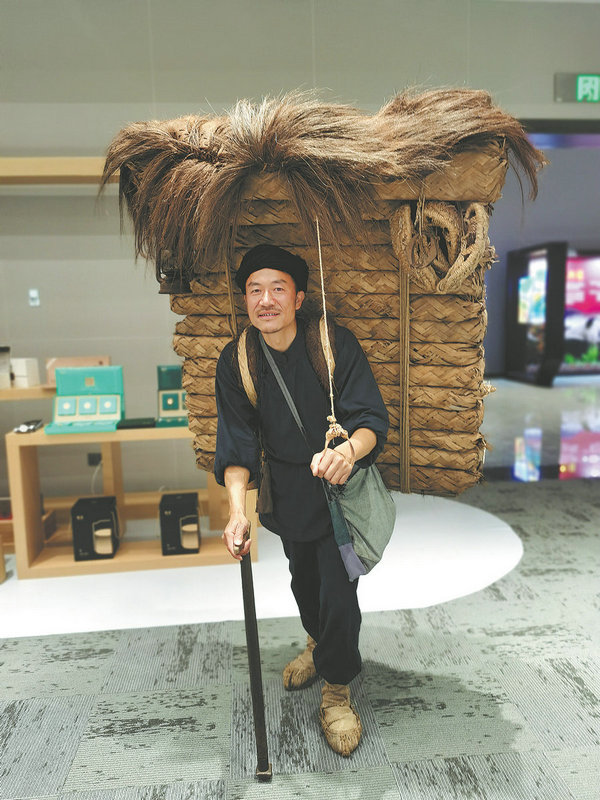Last of the tea porters trudges old trade route
By Huang Zhiling | chinadaily.com.cn | Updated: 2023-01-21 13:15

Visitors to agricultural or food-related fairs in Sichuan province may happen to see a 51-year-old dressed as an ancient porter carrying tea along the ancient Tea Horse Road.
With a large bag slung over his back and wearing sandals, Zhu Hengbin uses a cane to support himself now and then to rest. He appeals to interested onlookers,who ask him to pose for pictures.
Zhu's image as a poor porter is so vivid that visitors might think someone hired him to perform. In fact, he is a farmer from Mao'douba village in Wuxian town, Yingjing county of Ya'an, Sichuan province,who took the initiative to play the role to promote the ancient Tea Horse Road culture and tap the tea market.
Since ancient times, Ya'an has been the place where people pass from inland areas to the Tibet autonomous region. The city is rich in tea, and Tibetans of old drank a lot of it after eating beef and mutton.That's why the historical porters walked from Ya'an to Tibet. They wore sandals and carried bags of tea weighing 100 to 150 kilograms.When they got tired, they leaned on their canes to help support the heavy bags and rest for a while. When they were hungry, they ate some dry food brought from home.
The Tea Horse Road got its name from the longtime ancient trade of tea for Tibetan horses, which were valued for military use. A steady stream of porters delivered the tea to Tibet.
With easy transport facilities,nowadays, porters carrying tea on the ancient Tea Horse Road can no longer be found. They have been forgotten by many.
Helping people remember the porters has been Zhu's mission. He plays the role perfectly and has been called "the last porter on the Tea Horse Road".
Before 2010, Zhu often made his way through the deep mountains of Ya'an in search of traditional Chinese medicinal herbs. He then contracted for unused land on which to grow them. He was also an herb broker, buying and selling, and he became locally famous as a dealer in Ya'an.
But then an event occurred that changed his life and turned him into a tea dealer.
While searching for herbs one day in 2010, Zhu stumbled upon a large section of wild tea growing in Yingjing. All the plants were more than 50 years old. That year, Zhu registered his Porter brand of organic black tea with the Yingjing County Agricultural Department Co.
"Five years ago, the brand went into the market," he said.
Zhu does not use fertilizer or pesticides, and only gets rid of withered weeds in winter. In his opinion, to grow good tea, one needs to conform to the natural environment and agricultural laws.
To promote the ancient Tea Horse Road culture and his own tea brand, Zhu often carries a bag weighing 15 kg as he trudges along the ancient route - from Ya'an to Kangding, Ganzi Tibetan autonomous prefecture, in Sichuan - collecting and sorting out stories of the road and the porters who walked it.
In September 2021, carrying his bag of tea, Zhu traveled from Yingjing to Kangding again. The journey takes two hours by bus, but it took Zhu more than four months as he stopped frequently to record what he saw on the road. His short videos attracted the attention of netizens and made his organic black tea famous.
While some consider Zhu's journey a difficult performance art, he said the spirit of the Tea Horse Road porters empowers him and provides the spiritual motivation to live and strive for a better life.
























